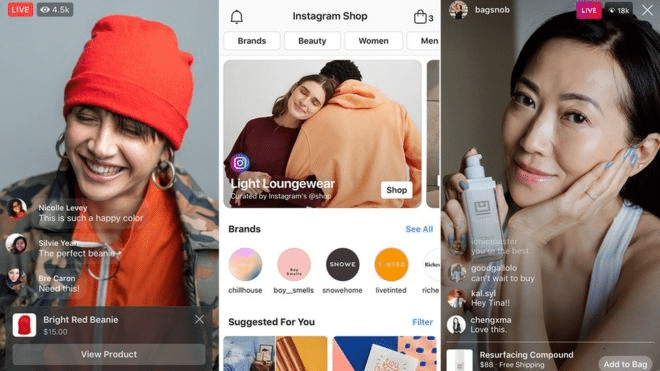
Facebook Shops will enable retailers to sell products directly to consumers on both Facebook and Instagram.
Businesses can create their own virtual ‘storefronts’, which can be customised with images and colours.
The store can then be featured on the business’ own profile page, as well as in Stories and adverts.
Sellers of all sizes are being encouraged to use the functionality, with no fees included for participating retailers – a model similar to the existing Facebook Marketplace, which surfaces local classified ads.
The initial stage of the Facebook Shops rollout has been brought forward and extended because of Covid-19.
The stores will appear on business pages, Instagram profiles and through targeted ads.
The company has already used a no-fees approach in its Facebook Marketplace for personal classifieds.
“It’s bigger than usual just because we want to make sure we’re moving quickly to get these tools in the hands of as many businesses wherever they are, big or small, to help them survive during this time,” Facebook’s Layla Amjadi said.
The feature will also be supported across Facebook and Instagram Live, enabling viewers to make purchases of products featured on live streams in real time.
Facebook claims that the launch of the Shops feature has been accelerated in response to the COVID-19 pandemic, which has caused a number of high-profile retail casualties, including Nordstrom and Gap.
The announcement comes shortly after news emerged that Facebook has acquired the .GIF website Giphy.
‘Hyper-personalised experiences’
Chloe Cox, Social Media Lead, at global ecommerce consultancy Wunderman Thompson Commerce argues Facebook always intended to move into commerce, giving it access to more data so it can offer more hyper-personalised experiences on its social media platform.
“Facebook’s online shopping initiative couldn’t have come at a better time for the social media giant,” Cox said. “It’s intentions to move into ecommerce were made clear with the launch of Instagram Shopping last year – and with many consumers encouraged to do their shopping online, there is a huge market for them to tap into. What’s more, a fifth of consumers already get their inspiration to purchase online from social media channels and buy 3.5 times a month through those platforms – figures almost certain to increase this year.
“The move will be beneficial for retailers and other businesses. Social media has always been a great way to generate interest, but when customers want to convert that into a purchase, they are moved off the platform to a brand site. This introduces friction into the customer journey when you want to convert and also plays into customers’ desire for speed and convenience.
“Equally, Facebook Shops works for the social media giant’s own business strategy. We have seen from Amazon that if you own the interface, you own the customer. If you own the customer, you own the data. And if you own the data, you own the future. Facebook’s model has always centred around advertising and through its shopping platform will help it provide a hyper-personalised experience that keeps customers on its platform for more than just social media.
“The move into social commerce for brands and retailers is a no brainer. Our research found that a fifth of digital commerce leaders believe that social commerce would be important in 10 years’ time, thus making it the number one commerce channel. Yet, whether or not this was a smooth marketing move by Facebook during a pandemic that has forced everyone online is up for debate, but the company will certainly win brownie points from small businesses and consumers alike in helping out a sector in desperate need of commerce.”
